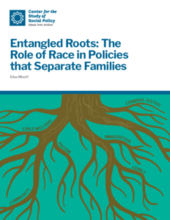Introduction and Summary
Children need loving and supportive families to thrive. This point is at once self-evident and confirmed by decades of research into children’s health and development. As a nation, however, we separate children from their families on a routine basis. Sometimes, family separation is the deliberate result of government policy—as it is when child welfare agencies remove children from their parents’ custody over concerns for their safety and well-being. At other times, family separation is an unconsidered, if not quite unintended, consequence of policy—as it is in the immigration and criminal justice systems, when parents are incarcerated and sometimes deported without their children. In all cases, however, children suffer the consequences. They long for their parents. They worry that they are at fault. They act out and have trouble in school.
Children of color are significantly more likely to be put in these impossible situations. Across the child welfare, immigration, and criminal justice systems, families of color are more likely to be separated, and children of color are more likely to experience the short-term distress and long-term trauma stemming from separation.
The role that race plays in policies that separate families has received more attention since the Trump administration’s decision to separate families at the Southwest border to further its racist and xenophobic immigration agenda. As this report details, however, racism has always played a central role in the publicly funded systems that separate families. It is time for us to step back and question the underlying assumptions shaping these systems, and the policies they implement.
Racism has both motivated policies that separate children from their parents and it has been institutionalized in the systems that carry on these policies. This is how racial injustice works. As the epidemiologist Camara Phyllis Jones has written, racial injustice is a result of “discrete historical events but persists because of contemporary structural factors that perpetuate these injustices.” In the immigration, criminal justice, and child welfare systems, racism has often compounded the disadvantage children and families of color experience because of poverty and economic inequality.
By examining the roots of policies that separate families and their entanglement with racial prejudice and discrimination, this report makes the case that we must embrace an alternative path. Policymakers’ goal across public systems should be to end the routine separation of children from their parents. Family separations should be rare, and their harm to children should be mitigated in the extremely unusual circumstances when they are necessary. Realizing this vision will require fundamentally re-thinking each of the systems that separate families. The need for system transformation is clear when one considers policy from the perspective of children and families—and especially the children of color who are most likely to be harmed by these longstanding policies.

